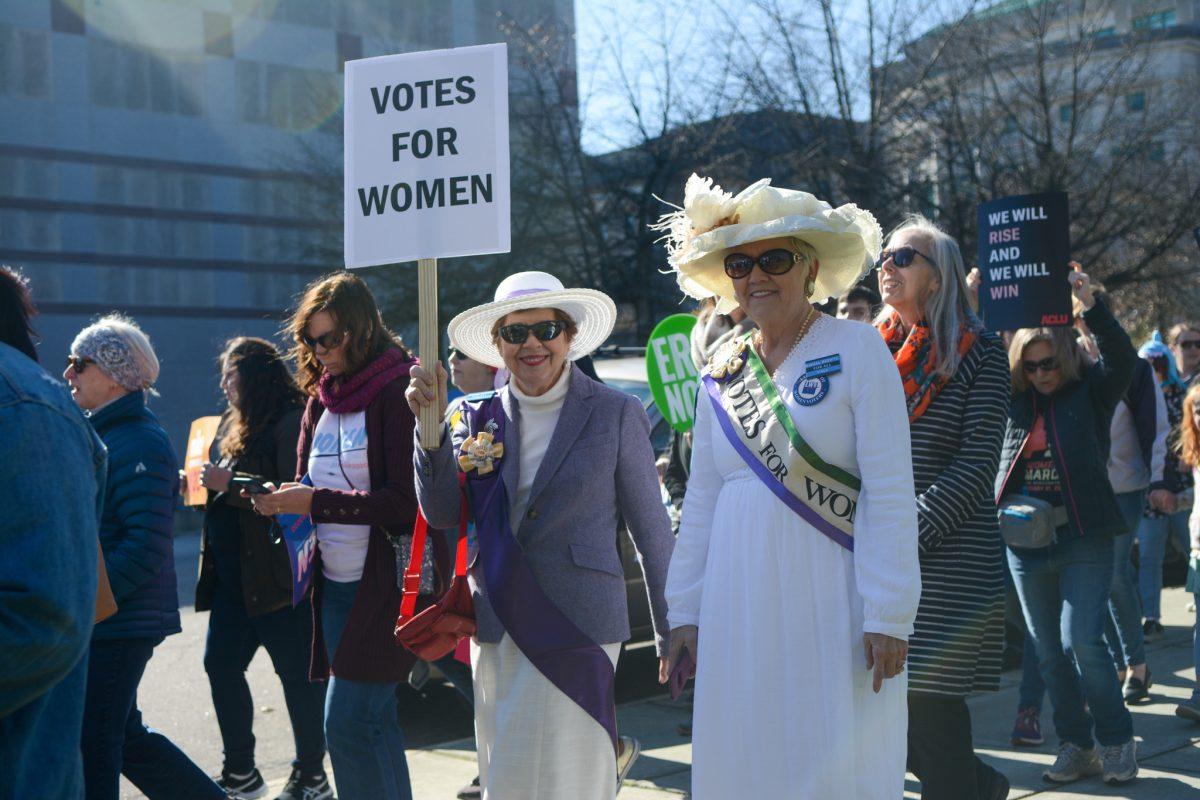On Sunday, Jan. 26, over 1,000 women and allies marched in support of values and issues that matter to women. Its official title, the “2020 Raleigh Women’s March: Women Protecting the Future” was centered at Halifax Mall in downtown Raleigh, with the march taking place around the Legislative Building.
Molly Rivera, deputy communications director of ACLU-NC, and Erin Terry, co-host and producer of Eyes Up Here Comedy, were co-emcees for the event.
“Our government has yet to fulfill its promise of a nation where all people are truly free and equal,” Rivera said. “So I’m here again this year to again call on lawmakers to recognize that their power comes from the people. It comes from us, and they must be held accountable by us, and they must work harder to end discrimination and injustice in all forms.”
Terry said almost 20 speakers attended the event, sharing their stories during the rally, which took place after the march.
“These [speakers] are … folks who are making a difference here in the Triangle and at large,” Terry said at a press conference before the event. “We’re so excited for them to be speaking on the following categories, which are: Women and Physical Harm, Women at Work, Women with Families, and Women as Residents. We’re going to have a lot of representation there speaking to these issues for not only where we’ve come from, but where we’re going.”
Mikahila Estwick, a first-year in animal science, said she marched to help break down barriers and misconceptions surrounding feminism.
“We’re in a mindset that’s of previous centuries,” Estwick said. “We can’t wait for other people to fight. It’s something that we need to do and be active about … Feminism is for everybody. It’s not assigned to a specific gender, and neither is masculinity or femininity.”
Some of those who marched did not have personal experience with women’s rights issues, but still came out to show solidarity with marginalized groups, such as Evan O’Donnell, a first-year in political science.
“I don’t exactly have the same personal experience, but I do believe that it’s still important to show solidarity for your friends and family and even those that you don’t know,” O’Donnell said. “Issues that [women face] are still very large issues in America, and just saying ‘It doesn’t affect me’ doesn’t help anything or do anything to change the issues that exist.”
Grace Szigethy, a first-year studying women and gender studies, attended the march as a Women of Welch Village staff member with a particular focus on abortion as a right for women.
“One [issue] that’s more important in the current day climate is our right to have a choice for our bodies and to have a right to an abortion if a woman needs one,” Szigethy said. “We don’t know what situation every woman is in, and it’s not fair to make decisions for them.”
Madison Mrzygod, a second-year studying criminology, volunteered as a march marshal and stagehand at the event, and was also a part of the 20 Things For Women To Do In 2020 demonstration.
“Without the promotion of feminism being intersectional, we face the hard truth that many people of color and those of lower socioeconomic backgrounds get left out, which is not what we march for,” Mrzygod said. “We march for the empowerment and equality of every man, woman and child. My expectations were high, and the results were so much better than I could have imagined. The thrill of volunteering for such a great cause and seeing the change you can cause is something that many people strive to see.”
Rivera said over 50 community partners were involved, with many setting up booths in Halifax Mall to provide resources and outreach with the Raleigh community.
“The future is trans, queer, intergenerational and proud,” Terry said. “We are excited to see the changes, because we are making them happen now. This is the time. These are our voices. We will not be silenced. We will not go back.”








